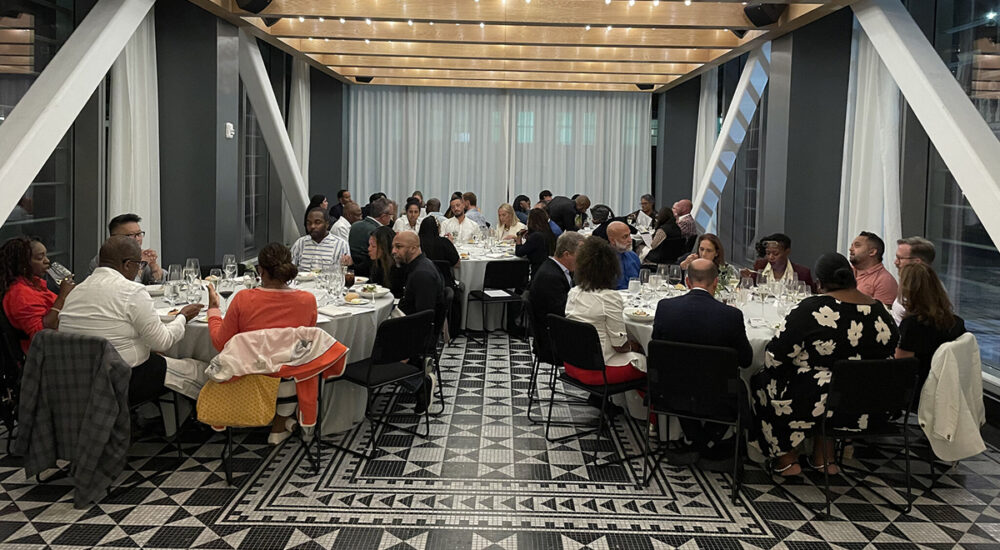On Wednesday, September 20th, we held our Inclusive Leaders’ Dinner at the Virgin Hotel in New York. The recent high court ruling on affirmative action is just the latest in a line of attacks on initiatives supporting diversity, equity, and inclusion. The idea of a dangerous “woke ideology” is gaining traction and fueling vocal opposition to initiatives supporting minority groups and companies who choose to speak out in support of their diverse employees.
The dinner was an excellent opportunity to hear from senior leader from across different companies about their experiences and ideas on making sure DEI stays alive and thriving for many years to come.
Key Takeaways
Doubling down on DEI
Organizations are grappling with a sense of foreboding after the high court ruling, necessitating a doubling down on diversity, equity, and inclusion (DEI) efforts. Antagonism that was previously beneath the surface has now surfaced, leading organizations to engage legal resources and emphasizing the need for clear communication. The younger generation, constituting a significant portion of the workforce, demands continuous demonstration of authenticity and commitment to DEI.
Addressing employee opposition to DEI initiatives
Engaging with employees who fundamentally oppose DEI initiatives requires a nuanced approach, particularly considering the anonymity often present in engagement surveys. Leadership’s commitment and vocalization of opposition play pivotal roles in shaping the organization’s stance on DEI. Ongoing dialogue and a commitment to evolving strategies are essential components for overcoming resistance to DEI initiatives.
Shifting focus to belonging
Shifting the focus to belonging requires caution to avoid creating an illusion of perfection. Striking a balance between recognizing the importance of diversity and fostering an inclusive culture is crucial. Belonging transcends individual characteristics, creating a workplace where every employee feels valued, included, and connected.
Business advocacy for diverse groups
The role of businesses in advocating for the rights of diverse groups is important, demanding a delicate balance between corporate responsibility and understanding employee sentiment. Advocacy efforts should align with core values and business objectives. Continuous dialogue and attunement to workforce expectations are crucial for effective advocacy on behalf of diverse groups.
The role of values in organizational culture
Corporate values should transcend jargon and serve as guiding principles for both organizational and employee behavior. Values are dynamic and should evolve with societal shifts and the growth of the organization. Reciprocal accountability creates a culture where values are not just statements on a wall but are lived out, shaping the collective identity of the organization.
Reflections
Navigating uncertain waters
The event revealed a palpable sense of foreboding in response to the recent high court ruling on affirmative action. Attendees expressed a heightened state of fear and uncertainty about the potential impact on diversity, equity, and inclusion initiatives. This atmosphere of uncertainty has prompted organizations to double down on their commitment, reinforcing their dedication to programs aimed at developing diverse talent.
In facing this uncertain landscape, the strategy has involved engaging legal resources to navigate potential implications. Despite the challenges, there is a notable commitment to persevere, underlining a collective determination to ensure that the commitment to DEI remains unwavering. This commitment extends beyond the immediate challenges, with organizations recognizing the need for continuous and transparent communication to address employees’ concerns and inquiries regarding the future of DEI initiatives.
Engaging the workforce in a changing landscape
One of the central discussions revolved around the internal dynamics of organizations, especially concerning employees who harbor fundamental opposition to DEI initiatives. The anonymity often associated with expressing dissent, particularly through engagement surveys, emerged as a complicating factor. Leaders highlighted the importance of addressing opposition not as a unified force but as varied expressions with unique perspectives from both minority and majority groups.
The sentiment at the top emerged as a critical factor in shaping the organizational attitude on DEI. Leaders emphasized the necessity of meeting individuals where they are, adjusting strategies based on the audience. Education and awareness initiatives were underscored as essential components, not only to overcome resistance but also to foster a broader understanding of the importance of diversity, equity, and inclusion. The commitment to making the business case for DEI remained a persistent theme in overcoming opposition and ensuring a shared commitment throughout the organization.
Shaping a future of inclusive advocacy
The event delved into the evolving landscape of advocacy and the role of businesses in supporting the rights of diverse groups. It emphasized the delicate balance required in deciding when and how to speak up on key issues, considering both corporate responsibility and employee sentiment. Proactive engagement with the workforce was highlighted as crucial, ensuring that organizational viewpoints resonate with diverse perspectives within the company.
A nuanced understanding of the broader societal context was emphasized in navigating the intricacies of advocacy. The event underscored the strategic alignment of advocacy efforts with core values and business objectives. They acknowledged the role of organizational advocacy in influencing employee morale and engagement, which needs continuous dialogue across different levels of the company. The discussion recognized that a commitment to DEI extends beyond internal policies to encompass external societal issues, shaping a future where businesses actively contribute to the overall well-being of diverse communities.
